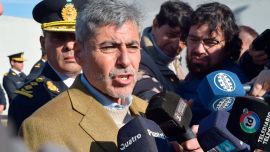Everything about Horacio Rodríguez Larreta seems to be carefully planned to produce a specific outcome. In and of itself, this isn’t problematic, in particular when it comes to a politician whose primary skill is to be an efficient manager, one specialised in executing public policy effectively at the municipal level. Yet, when moving from that space to the field of public opinion, which is where electoral battles are won, things become much more difficult to control.
The Buenos Aires City mayor has proven to be extremely resilient in the political coliseum, accepting that he would be Mauricio Macri’s number two for more than a decade and fighting Gabriela Michetti and Martín Lousteau tooth and nail in order to secure his position, while in recent years he has become the main political target of the pan-Peronist Frente de Todos coalition. This level of planning and resilience clashes with the “administration” of his public-private persona, in particular his family life, which his communications team has tried to control in the media (effectively when it comes to major outlets), but always leaving a certain sense that something is off in the informed public opinion. For a team that relies heavily on surveys and focus groups that are highly specialised, it is odd — to say the least — that they cannot succeed in convincingly making Rodríguez Larreta a charismatic and palatable presidential candidate, even if he appears to be the best option out there to many who are looking for a moderate centrist willing to reach agreements with the opposition.
In a carefully staged interview with journalist Luis Novaresio on LN+ on Wednesday night, Rodríguez Larreta finally took public his relationship with Milagros Maylin, a 36-year-old official in the Buenos Aires City government with whom he had long been rumoured to have been having an affair. The mayor had suffered the friendly fire firsthand during the heat of the pandemic, as Perfil senior editor Ernesto Ise has chronicled. Back in 2020 when news of his divorce from his long-time partner of two decades, Bárbara Diez, was made public, the mayor (at a time when his collaboration with President Alberto Fernández and Governor Axel Kicillof during the heyday of Covid-19 earned him incredible levels of popularity) suffered a series of carpetazos (previously defined in this column as calculated information leaks, whether true or not, destined to hurt the personal reputation of the target), suggesting all sorts of personal foul play. Since then, the constant questions across Buenos Aires’ newsrooms have been ones about his new girlfriend, and what his ex would say (she did post and subsequently delete several suggestive messages on social media).
The well-orchestrated public outing of his girlfriend is probably tied to his presidential bid. “You know they say I’m rigid,” Rodríguez Larreta told Novaresio, “she softens me up, she’s good for me.” After finally having had the courage to make their relationship public, the mayor will have to focus on a multi-front war over the coming months if he is to secure the Juntos por el Cambio presidential nomination, not to mention his approved choices for his successor in the City, the next governor in Buenos Aires Province, and the heads of slates for the congressional elections. It won’t be an easy task, but he succeeded in the 2021 midterms imposing former deputy mayor Diego Santilli in the Province of Buenos Aires and supporting former governor María Eugenia Vidal in the City.
The concessions were taken from Mauricio Macri, who remains the patriarch within the opposition space. In the same interview on Wednesday the mayor was asked whether his candidacy would depend on Mauricio’s, something Rodríguez Larreta denied. He did acknowledge that the former president “is acting like a candidate” – that’s the biggest question mark hanging over the opposition coalition that has high hopes of returning to the Casa Rosada next year given the debacle of the Fernández-Fernández administration. The going hypothesis is that the Peronists are screwed in every scenario: Cristina Fernández de Kirchner’s rejection figures are sky high, as are Alberto’s, while Economy Minister Sergio Massa has been recovering some points on that front though they are likely tol be insufficient to overcome deeply negative figures unless he unveils a stabilisation plan that actually works (that won’t happen).
In the Rodríguez Larreta camp the following logical step has to do with Macri: he won’t run. Not only is former first lady Juliana Awada completely opposed, the ex-president knows he would never win — unless his opponent is Cristina, but that’s another story. So why is he still toying with a potential candidacy, and why does he allow the “hawks” to attack him relentlessly? PRO party chair Patricia Bullrich is Macri’s designated sparring partner for whoever wants him out of the game, starting with Rodríguez Larreta. Supposedly she would stand down if Macri runs, but would be willing to go head-to-head in primaries, where some polls put her ahead of Rodríguez Larreta. Beyond Macri and Patricia, the mayor faces other contenders such as neuroscientist and lawmakerFacundo Manes (representing the Civic Radical Union, UCR) and Jujuy Governor Gerardo Morales.
While Rodríguez Larreta represents a centrist tendency in Argentine politics — also apparently espoused by Alberto Fernández — the true protagonists are still Macri and Cristina. Recently, Miguel Ángel Pichetto, who shared the ticket with Mauricio in 2019 as vice-presidential canidate, bluntly stated that “you cannot play the political game with substitutes,” suggesting that both big hitters should be candidates, an idea that has been growing among CFK’s supporters ever since the botched assassination attempt against her.
There’s always the small doubt that they are actually playing us all, and that Macri and Rodríguez Larreta had it figured out all along. Divide and conquer: the hawks and ultra liberals with Macri, the centrists and non-Kirchnerites among the Peronists with Horacio. That would make them smarter than they look. Even if they’re not, Rodríguez Larreta comes out as a rational and moderate leader looking to make concessions with leaders across the aisle pragmatically. Doubts regarding his private life, and even unfounded accusations of corruption, will continue to hold him back in the eyes of part of the population, as well as his lack of charisma. If he makes it to the Casa Rosada, he’ll have to be extremely efficient, and careful.



















Comments